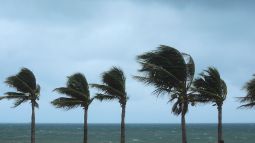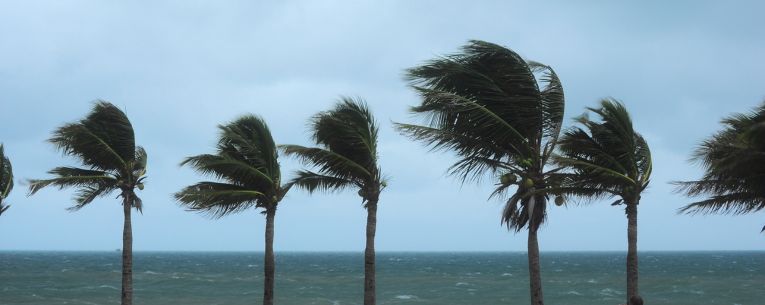What’s the number-one biggest threat to your upcoming travel plans?
Most likely, it’s the weather. Inclement weather is the reason for more than 75 percent of all flight delays, according to the FAA.1 With this in mind, you’re probably wondering: Can Allianz Travel Insurance protect you in case of a trip cancellation due to weather? How about delays?
It can, in certain covered situations and circumstances. Here’s an in-depth look at how travel insurance can help when severe weather threatens your trip.
How can travel insurance help during a weather-related delay?
If your Allianz Travel Insurance plan includes the travel delay benefit, it can do a lot to protect you when you experience a covered weather delay. This benefit can reimburse you for:
- Eligible purchases you make because of the delay, including meals, accommodations, communication and transportation.
- Lost pre-paid trip expenses, if the delay causes you to miss part of your trip
- Reasonable transportation expenses to help you rejoin your cruise/tour or reach your destination, if the delay causes you to miss the departure of your cruise ship or tour.
For your claim to be eligible for reimbursement, the delay must have been caused by a covered reason, such as a weather-related airline delay, and it must have lasted for the minimum time stated in your plan. Maximum limits and exclusions apply.
How can travel insurance help if you experience a weather-related trip cancellation?
When severe weather or a natural disaster causes an extended delay so your travel carrier can’t get you to your destination for at least 24 hours from your original scheduled arrival, that can be a covered reason for trip cancellation. If you cancel the whole trip, your trip cancellation benefits can reimburse your prepaid, nonrefundable costs, such as airfare, cruise tickets, tour bookings and hotel reservations.
Other weather-related covered reasons for trip cancellation:
- A mandatory evacuation is ordered due to a natural disaster at your destination
- Your destination is uninhabitable (because of weather-related damage or another reason)
- Your home is uninhabitable (because of weather-related damage or another reason)
- The multi-day tour or multi-day event that is the main purpose of your trip is canceled due to a natural disaster or severe weather
- You or a traveling companion serving as a first responder is called for duty due to a natural disaster or other emergency
Benefits and covered reasons vary by plan, so be sure to read your policy documents for details and exclusions.
Doesn’t the airline have to compensate me for a weather-related flight delay?
A lot of people think this… but unfortunately, it’s not true. In the U.S., airlines generally provide passengers with a hotel voucher (plus transportation to the hotel) and/or a meal voucher only if the flight delay/cancellation was caused by a reason within the airline’s control.2 A crew shortage, a cleaning delay, or a mechanical problem would be a controllable reason. Weather is not. For a weather-related flight delay or flight cancellation, airlines in the U.S. are only obligated to give you a refund (if you choose not to fly) or a seat on a different flight.
What about in the E.U.? There, airlines are supposed to compensate you for a flight delay longer than 3 hours, unless it was the result of an “extraordinary circumstance,” such as severe weather. You may be able to argue that bad weather wasn’t an extraordinary circumstance if, for example, other airlines’ flights departed on time and yours didn’t.3 But you’re not guaranteed any compensation.
That’s why travel insurance is so valuable! Find the perfect plan for your next trip.
What kinds of severe weather can travel insurance cover?
We define severe weather as “hazardous weather conditions, including but not limited to windstorms, hurricanes, tornados, fog, hailstorms, rainstorms, snow storms, or ice storms.” These are the most common types of severe weather that cause travel disruptions. But other weather phenomena can cause problems too, such as:
Thunderstorms
Hurricanes may grab all the headlines, but regular old thunderstorms (aka convective storms) are the number-one flight disruptor in the U.S. Summer storms “typically form, grow and move swiftly, covering large swaths of airspace,” the FAA notes. “Many start in the Ohio Valley and move east, impacting air travel in the Northeast, particularly New York.”4
Lightning
Lightning forces airports to close ramps for safety, which can cause “notable air traffic impacts on both departures and arrivals,” according to the National Center for Atmospheric Research.5 “The inability to ready aircraft for departure during ramp closures will result in a delayed gate pushback time.”
Extreme heat
More flights than ever before are being affected by super-hot weather. If the ambient temperature is too high, planes sometimes have to reduce the weight they’re carrying in order to take off. That means ditching some fuel, unloading some baggage, and/or bumping passengers.6 If you’re flying out of an airport that’s known for high summer temperatures, consider booking an early-morning flight to avoid problems.
Extreme cold
Remember when the polar vortex caused thousands of flight cancellations? While airplanes have no problem flying in super-low temperatures, cold conditions can cause problems on the ground. Planes have to be de-iced, and airport workers can’t stay out in harsh conditions for long. This causes delays in readying planes for takeoff.
Wildfires
While a wildfire itself may be considered a natural disaster rather than a weather phenomenon, the smoke that pours into the atmosphere can become a big problem. Wildfire smoke causes more flight delays than rain or fog, the FAA explains, because aircraft navigation systems don’t work as well when the air is full of smoke and ash.7
If I choose to cancel my trip because the weather is bad, what does travel insurance cover?
If you (not the airline or other travel carrier) decide to cancel, interrupt, or delay your trip simply because the weather is unfavorable, that typically won’t be covered by insurance. A few examples:
- You reschedule your annual golf trip because it’s supposed to rain all week.
- You check out of your beach house early because cold weather and clouds are in the forecast.
- You cancel your family’s ski vacation because warm weather melted all the snow.
Travel insurance would not reimburse lost trip costs in any of these situations… unless you had purchased the Cancel Anytime upgrade. Available as an add-on to our most popular plans, OneTrip Prime and OneTrip Premier, Cancel Anytime can reimburse 80% of your prepaid, non-refundable trip costs if you cancel your trip for almost any unforeseeable reason your plan does not already cover (exclusions still apply; not available in all states).
Remember: To protect yourself, you have to buy travel insurance before bad weather is on the horizon! If you already have a trip planned, purchase travel insurance right now. Get a quote.
Related articles:








Share this Page